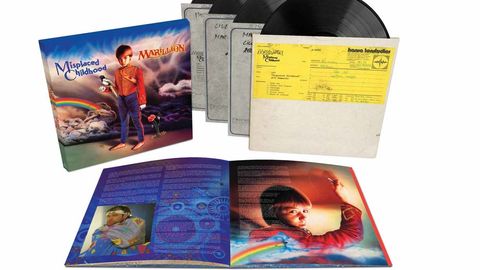Given its intrinsic importance of to music itself, one could deduce that timing is of far less consequence to the record companies. This is because this quite excellent repackaging of Marillion’s most successful and famous album arrives unlinked to anything approaching any sort of anniversary. When Prog spoke to the label two years ago, when we were doing a 30th Anniversary of Misplaced Childhood cover, to see if they had any plans, the answer was no. Yet here, in its 32nd year, we get the reappraisal. Still, prog always has been about odd timings…
For Marillion though, Misplaced Childhood really is all about timing. After a bright, punchy debut album and a slightly stuttering follow-up, their backs were ever so slightly up against the wall to come up with sellable goods to appease their EMI paymasters. Probably just as well, then, as revealed in Prog writer Dave Everley’s excellent liner notes in the accompanying booklet, that they didn’t tell EMI they’d decided on a concept album at that point…
Musically, Marillion hit pay dirt with Misplaced Childhood. The one-two punch of Kayleigh and Lavender as massive hit singles and the fact that it is not a musically or conceptually overbearing album make its success more understandable. For overbearing, you look to follow-up Clutching At Straws - a fact which also possibly explains why that album is often cited as preferable by the band’s intense fan base.
But of course, we know the history and the music. What you really want to know, even above what else is on the five CD/Blu-rays or four vinyl albums, is how do Steven Wilson’s new mixes hold up? They sound great to these ears. As both a fan and an endearingly faithful remixer, Wilson’s 5.1 sounds crisp, precise and, as one might expect, fuller of sound. It merely enhances the listening experience, without bringing anything new (and therefore unwanted) to the table.
What else is there? The B-Sides (Lady Nina also gets a Wilson remix) and demos (many of which appeared on the 1998 reissue) and an unreleased 1985 Utrecht gig (well, Chelsea Monday was the B-Side of Heart Of Lothian). The CD set has the promo videos and an excellent documentary on the making of the album. And the vinyl set features a replica tour programme. So take your pick. Or buy both…
At the end of the day, the enduring appeal of Misplaced Childhood, and of Marillion’s entire catalogue, is that they have always written great songs. Enjoying them in 2017 is akin to enjoying them all over again for the very first time. An utter delight.


